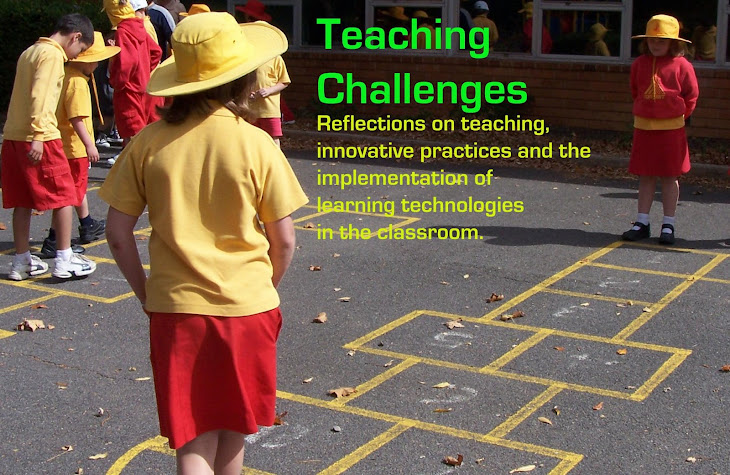I'm on holidays at the moment and so have had the luxury of time for reflection. While I painted the window frames and walked the dog I listened to some podcasts and pondered my current
 teaching practices when it comes to the integration of technology.
teaching practices when it comes to the integration of technology.A lot of people in my Personal Learning Network (PLN) seem to be doing this at the moment, and I think a recurring theme is: Yes, we have a lot of cool tools, but WHY are we using them? How are we improving student learning outcomes through their use? Now I'm not saying that we shouldn't be using ICT, I'm just saying we should be able to give a reason for why.
Here is an overview of the resources and what that helped me to think through.
It's Elementary #33 - Interactive Whiteboards
This podcast helped me to realise that in my classroom most of the Smart Board touches are actually mine. I use the Smart Board predominantly as a teaching tool and don't give my students enough time to interact with it. I'd like to think of some new ways to ensure that my students are touching it more throughout the day.
One thing that urks me about interactive whiteboards is that only one person can be manipulating it at a time - be that me or one of the students. When we use it for games, we have to pass the keyboard around the classroom, and the other kids get bored. I try to beat this by getting the rest of the class to write the answer with their finger on the carpet, but by the end everyone has had enough! Maybe we need to rotate through groups while the other students are doing book work or other activities.
On the positive side, I also realised that my students learn a lot through my use of the Smart Board as a tool throughout the normal school day. I teach basic computer skills through modeling as I use it and troubleshoot. I would be lost without it at this point because I use it for so much of my teaching. I use it to show pictures, use graphic organisers, search for information online, brainstorm, show videos, present written instructions, do quizzes, play games, display a scanned worksheet for explanation, and with my 'document camera' to model Maths concepts.
Using Technology for Higher-Level Thinking - Am I?
This blog post, by J. Mendel made me think some more about how I am using technology to develop higher-level thinking. One of the many jobs on my "Things to Do List" is to develop a resource that demonstrates how technology can be tied with the Quality Teaching Model. I'm just not sure when I'll have time to get to this!
The videos students created for our Rowan of Rin unit really challenged student thinking. They collaborated with others to search through the text to determine how their characters may have been feeling at different points in the story. They then conducted video interviews (news broadcast style) to present this information. By the end of the unit, students were creating their own questions for characters to respond to, and were throwing in some dramatic flair! The part of this project that I'm disappointed with is that I'm sitting in my own home editing the videos with fade in/fade out, text slides etc all without the input of students. Next time I want to find a way for them to take part in the whole production.
The Technology Specialist as Teacher Leader (from K12 Online 2007)
In this podcast Patrick Ledesma talks about the right way to get people on board with ICT. He talks about getting the infrastructure working well, making the links to the curriculum etc and THEN having fun with it. He warns us not to just be seen as Tech Geeks enjoying all the fun toys!
Holding a Mirror to our Professional Practice (from K12 Online 2007)
In this podcast Derek Wenmoth talks about the value of reflecting on our practices. He shares a tool that was developed to help teachers to self-reflect on how they are using ICT in the classroom.
I tested out the Educational Positioning System for ICT and found it quite useful. While it only gives back the information you give to it, the process aids your reflection and the information comes back to you as a visual representation in the form of a map. It helps you to clarify your philosophy and you can easily see your areas of strength and weakness.
From using this tool, I realised that an area for my own further development is using ICT to explore student creativity. I'm thinking now of new ways to allow students to access technology to get creative.
And one last one, more for fun, Kerrie Smith wrote Are You a Digital Collaborator? about recent research into Internet Typology and the use of mobile devices. There is a quiz you can take to determine where you fit into the mobile technology typology. (Wow, lots of 'ology' words!) This is more about your personal use of ICT than your classroom use of it, but I found it interesting all the same.
If you liked these, here are some more Tech Tips.






No comments:
Post a Comment
I'd love to hear your thoughts and questions. Please don't be shy...
:)